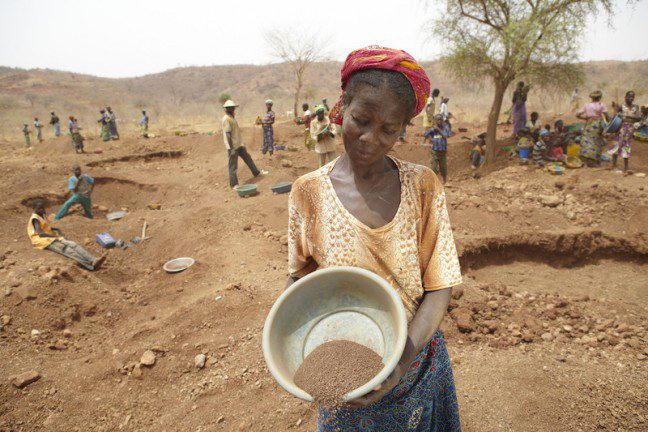Along with their neighbours in Mali, Niger, Mauritania and Chad, more than two million people in Burkina Faso are currently facing severe food shortages. Failed harvests, disproportionately high food prices and alarmingly scarce water are threatening the lives and livelihoods of the population.
Burkina Faso is rich in gold, and people have taken to digging holes in the desperate hope of finding even small amounts of this precious mineral. These prospecting sites develop spontaneously, as men, women and children arrive to dig with rudimentary tools from sunrise until evening.
A lucky few manage to find enough to buy a bike or a motorcycle. But most dig non-stop just to ward off hunger, finding only enough gold to pay for one meal a day.
Fatimata Sawadogo is 40 years old and has five children. She lives in the village of Goragui, 10km from the nearest gold washing site. Recently, Fatimata has been walking there almost every day to try her luck. Here, she describes her routine.
Fatimata’s story
I dig the earth, I sift it, and then I put it in water. If there is any gold, that’s how I see it. I began to come to the place two or three months ago. After I’ve worked for two or three days, I rest for a day and … and the next day I have enough strength again. We all have positive and negative thoughts. I think about my children and I think about food. I am also sad because my husband is too old.
I am very worried about my children because they are so young. Our crops aren’t sufficient to feed our children. I’m worried this season because last year’s crop was so poor! I’m worried about food because when it doesn’t rain, drought becomes famine. My husband is trying to find a way of buying grain; that’s why I’m coming to this site to look for gold. During the last three months, I have dug and not been able to find more than 5,000 CFA francs (AUD $9.80) worth of gold. Even if it had rained, I would still have come here, but not so regularly as I do now. Once I return home, my entire body aches with pain. It takes me some time to get to sleep because of the pain in my muscles.
In the morning, I have to walk for about an hour to get here … I bring water from the last village before the site … I also bring food from home but it isn’t enough… I have faith in life, I hope God can help me. I spend a lot of time thinking because I have never seen such a difficult situation. Life has become difficult because the rains are becoming more and more scarce and the harvests are poor.
When I’m lucky, I find enough gold to sell for 2,000 CFA francs (AUD $3.90). This amount of gold is as light as a matchstick. On the other hand, I can come here three times and come up with nothing. When I find some gold, I sell it and go back home with the money … Today I’ve found some, I’m going to sell it over there… it’s such a joy not to have worked for nothing… Some buyers give us a good price, others don’t. Yesterday I didn’t do well when I was selling because I was in a hurry.
God alone knows what will happen if there is no rainfall … if it doesn’t rain, people will find it very difficult to find food. There won’t be any food, what food there is will be very expensive and we don’t have any money here.
I’ve never asked one of my children to come with me to the site to look for gold. Out of my five children, four of them were at school, but there’s only one still there, the rest have left. I haven’t any goats or chickens. We have nothing, just a donkey to help us…
People come to the site from different places. When we find gold, we are happy for each other but when we find nothing, we are just sad. I know people who’ve found gold nuggets, but they rarely come to the site now.
Find out more
Read about how Oxfam is responding to the food crisis in West and Central Africa
Senegalese singer Baaba Maal joins forces with Oxfam

